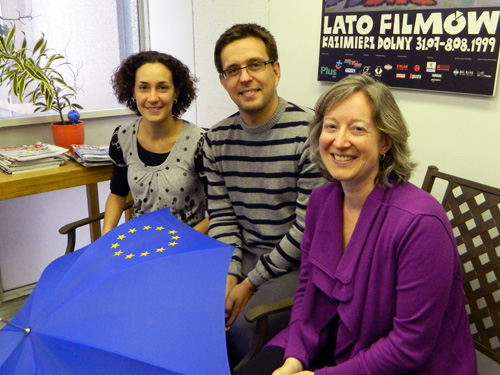At Guelph presents this story as part of a series that highlights University of Guelph leadership in teaching excellence and the scholarship of learning.

Chiara Salari is bringing her first-hand insights into her European studies courses this semester. She is the first student to study at Guelph as part of the Crossways in Cultural Narratives MA program (see http://www.munduscrossways.eu/ for details). A native of Italy, she had previously spent time in France, but says, “I was looking for a bridge to my doctoral research and this program offered the scope I wanted.”
Coming to Canada is turning out to be an enjoyable adventure, she says. Salari expected to have to deal with differences in weather and food (“I’m very adaptable,” she says) but was surprised to find how different classes were. “In Italy, you usually have bigger classes with lectures and books to read, then a final exam. Here there is much more discussion during classes, and you do papers every month. Also, I find that every class takes an interdisciplinary approach here.”
Learning to organize her time to fit the workload here was her biggest challenge, she found, but the rest of the move has gone smoothly. “I think the internet helped to make it an easy adjustment: I was able to see my room and images of the community online before I ever came here.” She also credits the support she received from the staff and faculty of the Crossways program.
Salari wasn’t the only Crossways participant on campus. For several weeks this fall, U of G also hosted Jocelyn Dupont, professor of English and American studies at the University of Perpignan Via Domitia in Perpignan, France. Dupont is the local co-ordinator of the Crossways in Cultural Narratives program at his university, so he was able to help U of G’s co-ordinator, Prof. Margot Irvine, become familiar with running the program here. Guelph is the first North American university to be a full partner in the Crossways program, which is funded by the Education, Audiovisual and Culture Executive Agency, a division of the European Commission.
Dupont, who was here as a visiting scholar, feels the differences in teaching styles Salari mentioned may be one of the bonuses of taking part in this international master’s program. “It gives you new skills. I had a Ukrainian student who arrived at the University of Perpignan not knowing what a dissertation was. Apparently, in the Ukrainian schools, you learn everything by heart.”
He’s also experimented with new teaching skills to conduct classes at U of G, where he presented talks and seminars on various topics, such as the translations of Edgar Allan Poe by Charles Baudelaire and the theory of Georges Bataille. “The students have loved his talks,” says Irvine. European Studies will host two more Crossways visiting professors this year. Prof. Alicja Zuchelkowska of Adam Mickiewicz University in Poznan, Poland, spent two weeks at U of G in October and Prof. Élodie Chazalon from the University of Perpignan will visit in January.
Having Salari and Dupont on campus benefits all the students they connect with, Irvine points out. “It’s good to hear other ideas – they can become part of your own work.” As an Italian, Salari is able to offer a different perspective during class discussions, and Dupont says he’s had several emails from students asking for more information about some of the concepts he presented.
Of course, for Salari it is also intriguing to hear a North American view of Italy from the other students in her classes. Another bonus of being at U of G is that she’s been able to take on a teaching assistant position to help with costs, something that is not usually available at European universities. The Crossways in Cultural Narratives program provides scholarships, awarded on a competitive basis, including funds to cover travel costs between the partner universities.
Dupont adds: “It’s an excellent program and highly valued in the job market. Our students find they are easily accepted into PhD programs. At graduation, they get degrees from all three of the universities they attended. Plus the experience of doing your MA across Europe and across the Atlantic truly broadens your horizons.”
Being part of the Crossways program also has its challenges. “You have to start over each time finding a new place to live and making new friends,” says Salari. But she also sees that as a benefit: she’s learning the skills that will make it easier in the future, and building an international network of friends and colleagues. “We have a Facebook group, and people get to know each other and make plans to meet when they can do a semester somewhere together. If we have questions, we can ask each other.”
That Facebook group was started by U of G but was quickly taken over by the students, says Irvine. “You develop such a great network of contacts around the world through this program.”